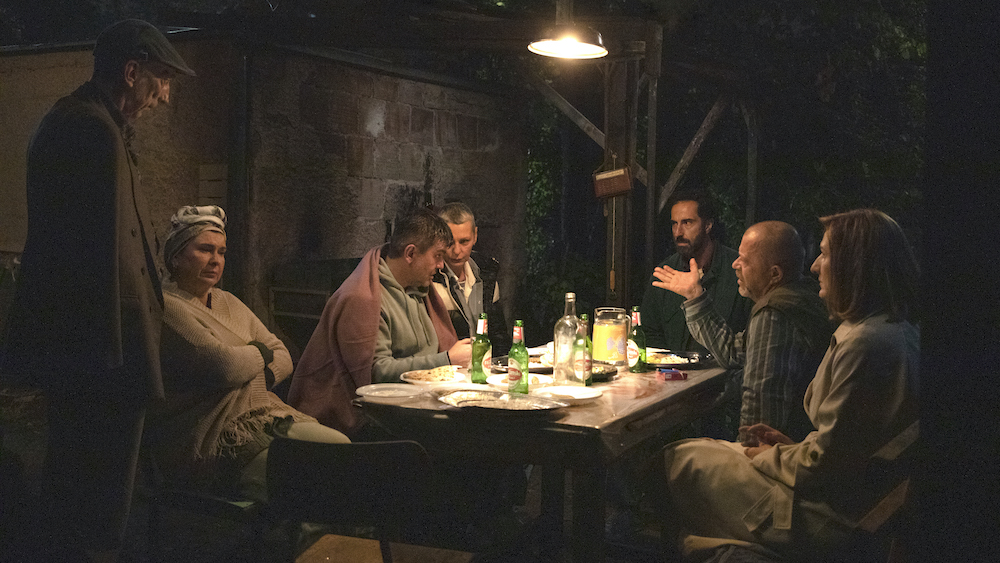The long shadow of the war and its ravages continue to haunt a group of late middle-aged Sarajevan friends in the low-budget, tonally uneven dramedy “May Labor Day” from Bosnian multi-hyphenate Pjer Žalica. Although the material is both a little thin and a tad familiar, the script ticks off a range of contemporary social problems and issues such as the brain drain to Europe of the educated younger generation, junkie no-hopers who get clean through faith, the orphan kids kept off the street through charitable ventures and the nagging dissatisfaction felt by the ordinary men who fought for their country, but feel that it has lost its way.
Serving as the closing night attraction of this year’s Sarajevo Film Festival, “May Labor Day” is a co-production of all the territories of former Yugoslavia and features an ensemble of the region’s best-known actors, who appear to take great pleasure in performing together. Outside of the region, interest will likely be limited largely to festivals.
Capturing the small-village feel of some Sarajevo neighborhoods, a good portion of the tale unfolds through dialogue around a communal table in a courtyard. This spot is mostly the province of the older men, although their women folk, who are more apt to gossip in their kitchens, join them there from time to time.
Popular on Variety
As the film starts, Zuna (Emir Hadžihafizbegović), Numo (Admir Glamočak), Mustafa (Aleksandar Seksan) and Savo (Boris Isaković), who is visiting from Canada but can’t quite decide where he feels at home, are arguing about where to buy the all-important meat portion of their upcoming May Day barbecue, when Goga (Branka Katić) arrives in a panic to announce that their neighbor, the never-seen Fudo, has been taken away by the special forces.
On the heels of this development, and making things more complicated, Fudo’s adult son Armin (Muhamed Hadžocić) arrives from Germany on a surprise visit with his new wife (co-producer Labina Mitevska). She’s a Turkish-German physician, whose presence inspires some jokes about a Turkish hospital soap opera that is popular in Bosnia. As the group of friends try to discover what Fudo is accused of, Armin, who has spent much of his life abroad, learns more about his father.
The barely-defined female characters (wives, mothers, girlfriends) feel short-changed as far as the story is concerned, but definitely come off as more mature than their quick-tempered male counterparts. The normally strong actress Jasna Žalica, the helmer’s wife, never gets the chance to rise above caricature here. However, Tatjana Sojić gets the opportunity to make an impression with her guitar and a song when the women have the courtyard to themselves. Meanwhile, the breezy Goga is forced to do a lot of heavy lifting for the plot, providing explanations for many things from the past and calling on connections such as friendly law enforcement officer Hamlija (Branimir Popović) for help.
Like several other Bosnian helmers, Žalica’s career has basically been defined by war. He got his start as a director making documentaries during the siege of Sarajevo and his feature filmography, from “Fuse” (2003) to the 2020 Sarajevo fest opener “Focus, Grandma,” deals with the tensions and trigger points of the region, and the (sometimes failed) efforts of his compatriots to move on.
Essentially capturing the conflict between the need for people to feel good, have fun and enjoy life and the harsh reality of the past which prevents them from doing so, or if they do, from enjoying it, Žalica’s script suffers from tonal problems: The blackly comic first half troes to get by on cynical charm before the second half suddenly turns serious as secrets and moments of grace come thick and fast. It. Nevertheless, the performances elevate the material and the cast succeeds in evoking neighborly warmth and a portrait of families who know one another’s worst moments and are there for each other.
Given that the tech credits are nothing special and the locations relatively few, the narrative might work even better as a stage play, which could also incorporate the nostalgic and melancholic live local music that Žalica intersperses throughout.












